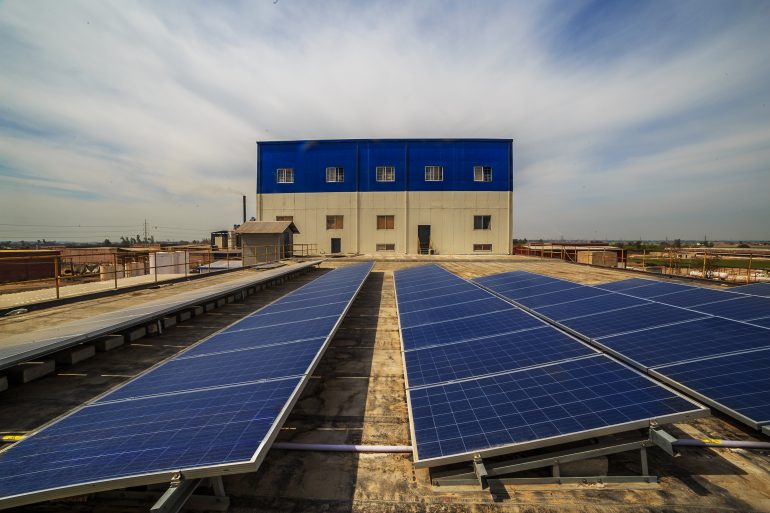8 of the most commonly asked questions on solar energy
Pakistan
500+ MW Solar PV
90 MWh REFLEX
5,500 Telco Towers

1. How do solar panels actually work?
Solar panels are made of highly excitable, conductive materials. When the sun’s rays hit the solar panels, the reaction creates direct current (DC) electricity.
Since most businesses use alternating current (AC) electricity, your solar-generated DC energy will pass through an inverter to become AC electricity. Then it flows through your property’s wiring and behaves just like the power you’ve been using your whole life.
2. Is solar energy reliable and powerful enough for my business?
The only time your solar panels stop generating electricity is when the sun’s not out. That means at night and during eclipses.
The sun is constant. It rises and sets pretty routinely. It’s more predictable and reliable than power plants, which often experience outages several thousand times every year.
Maybe that’s why the U.S. Department of Defense pledged to purchase 3 gigawatts of clean energy for its bases by 2025. As of 2016, they’re on track to meet that goal.
That’s renewable energy contributing power equivalent to nearly six coal plants!
Solar energy isn’t a passing fad. It’s the key to a future of lower electricity bills and a cleaner environment.

3. Will my solar panels generate electricity during cloudy, rainy, or snowy days?
Your solar panels don’t need sunshine, per se, to generate electricity as much as they need direct, unobstructed access to the sun’s UV rays.
Similar to how your skin still tans when it’s overcast outside, your solar panels will still generate electricity during cloudy, rainy, or snowy days — they just won’t produce as much energy as they do during clear days.
4. Do I have to go off-grid when I switch to solar energy?
In reality, you probably wouldn’t want to go off-grid. The practice is known as “islanding”, or when you connect your solar array to batteries so you’ll be able to power your business entirely on solar energy instead of using the utility company for power. This practice is incredibly expensive and inefficient for most people as batteries are not as technically developed as solar panels and need frequent replacement.
Most solar adopters choose to stay on the grid for convenience and money-saving.
When you stay connected to the grid, you’ll be able to generate credits with the electric company to lower the price of your bills. This practice is known as net-metering.
5. What is net-metering?
You know how you have an electric meter on your property to record how much energy your business uses every month from the utility grid. When you switch to solar energy, you’ll have an electric meter that works both ways; it shows the utility company how much energy you consume when your solar panels are not generating enough electricity and it also shows how much energy your solar panels generated during the day
Your solar panels will produce a lot of energy during the day when the sun’s the strongest. You most likely won’t use all this solar-generated power. Your excess solar energy will feed back to the grid and help supply power for the utility company. Your utility company will pay for your solar-generated electricity by giving you credits to lower your monthly electricity bill. So at the end of the month, you’ll only pay for the net amount of electricity.
Let’s say you banked Rs.100,000 in solar energy credits and used Rs.150,000 worth of electricity for the month. Instead of paying Rs.150,000 like you normally would, you’ll only have to pay for the balance i.e. Rs. 50,000.
6. How much will I really save on my electricity bills every month?
That depends on how much electricity your business uses, your location, the rate your utility company charges for electricity, and several other factors.
Most solar providers aim to offset at least 30% of your monthly electricity bill, so that’s a good place to start your calculations.
7. How soon will I notice a difference in my electricity bills after switching to solar energy?
Your solar panels will start generating usable energy for your property the day they’re installed. Depending on when you receive your electric bill, you could start noticing lower bills the very first month.
8. What is the best option for installing solar panels with my budget?
If you happen to have a business improvement fund, owning your own solar array is the way to go. While you can definitely pay for your solar installation up front, a lot depends upon your business’s financial goals.
You can also choose a power purchase agreement (PPA), and you’ll be able to make the switch to solar with little or no investment upfront. In a PPA, the business pays a monthly rent at an agreed upon rate for a period of 20 years. The business can choose to purchase the system or exit the contract after the end of the contractual term.


